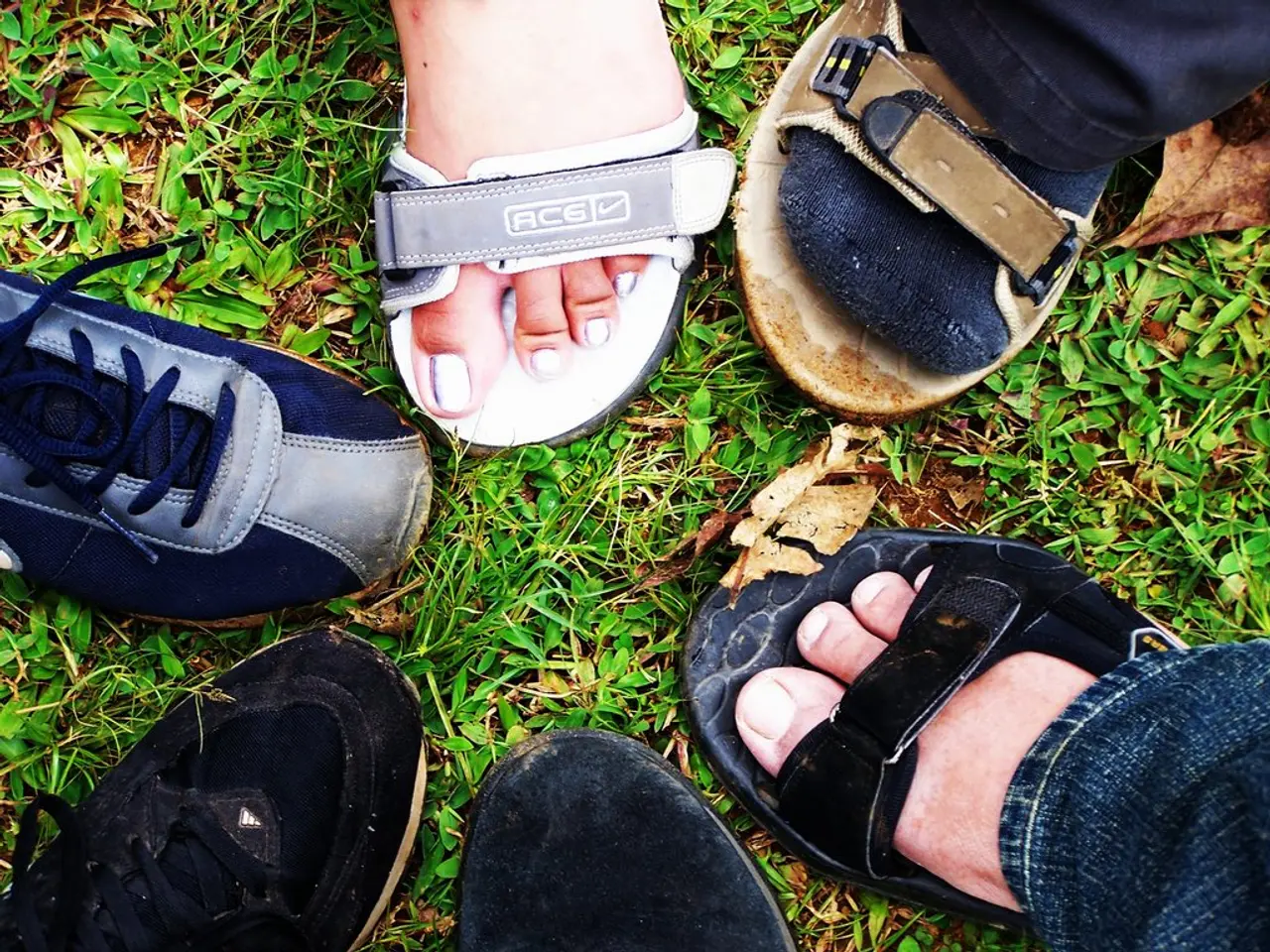Foot odor solutions: 12 strategies for prevention and elimination
Managing excessive sweating of the feet, also known as plantar hyperhidrosis, can be a challenge for many individuals. However, a range of remedies and medical treatments are available to help alleviate this condition.
One of the most popular and effective treatments is Botox (Botulinum toxin) injections. These injections block the nerve signals that stimulate the sweat glands, significantly reducing sweat production. The effect typically lasts 3 to 6 months, and treatments need to be repeated to maintain results. Side effects are generally mild and may include temporary muscle weakness or discomfort at the injection sites[1][2][3][4].
Prescription antiperspirants, such as medical-grade aluminum chloride solutions, are another effective option. These solutions block sweat gland ducts, reducing sweating. They are usually a first-line treatment and can be effective with regular use[3].
Oral medications, such as anticholinergics, may also be prescribed for severe cases. However, these are less commonly used solely for foot hyperhidrosis due to potential systemic side effects[3].
For those with widespread hyperhidrosis, systemic treatments may be necessary. These treatments carry risks like compensatory sweating and nerve damage and are considered a last resort[1].
Invasive options like microwave therapy and surgery are reserved for severe cases or when other treatments fail. Microwave therapy is FDA-approved for axillary hyperhidrosis but not commonly used for feet. Surgery, such as sympathectomy or sweat gland removal, carries risks like compensatory sweating and nerve damage[1].
Among these options, Botox injections stand out as the most effective and convenient medical treatment specifically for excessive sweating of the feet, with a good safety profile and lasting results[1][2][3][4]. Prescription antiperspirants are often used in conjunction or prior to Botox to manage symptoms.
If topical treatments and Botox are insufficient, consulting a healthcare provider for evaluation of more advanced therapies or surgical options is recommended[1].
In addition to medical treatments, several home remedies can help manage foot sweat and odor. Choosing shoes made from breathable fabric such as canvas or leather can help prevent sweaty feet. Hot shoes will make feet warmer and more sweaty, so it's recommended to change into a cool, fresh pair of shoes when feet start to sweat, and avoid wearing the same pair of shoes on 2 consecutive days[5].
Using antifungal powders or applying antiperspirant deodorant can also help manage foot sweat and odor. Dabbing a small amount of rubbing alcohol between the toes or on sweaty areas of the feet can instantly dry out the feet and stop foot odors. Soaking feet in a basin of warm water with two black tea bags can reduce sweating due to the tannins in the tea closing the pores in the skin[6].
Good foot hygiene is essential to managing excessive sweating and preventing foot odors and infection. Washing sweaty feet at least once a day with an over-the-counter antifungal soap or antimicrobial essential oil and drying the feet thoroughly is recommended. Applying a light dusting of antifungal powder or cornstarch before slipping on cotton socks and breathable shoes can also help manage sweaty feet[6].
It's important to note that approximately 5% of people worldwide experience hyperhidrosis, according to the International Hyperhidrosis Society[7]. Keeping a journal of sweating episodes can help identify triggers for foot sweating.
If home remedies are unsuccessful, a doctor will be able to recommend stronger treatment options for hyperhidrosis of the feet.
References: [1] https://www.ncbi.nlm.nih.gov/pmc/articles/PMC6135853/ [2] https://www.ncbi.nlm.nih.gov/pmc/articles/PMC5806682/ [3] https://www.ncbi.nlm.nih.gov/pmc/articles/PMC6526320/ [4] https://www.ncbi.nlm.nih.gov/pmc/articles/PMC5043123/ [5] https://www.medicalnewstoday.com/articles/325389#treatment [6] https://www.healthline.com/health/sweaty-feet#treatment [7] https://www.ncbi.nlm.nih.gov/pmc/articles/PMC3779922/
- Managing depression, a common mental health issue, can often be helped through various therapies and treatments, including medication and cognitive-behavioral therapy.
- Science has shown that regular exercise and nutrition play key roles in both mental health and overall fitness and exercise.
- In addition to mental health, science has also shown the importance of skin care in maintaining eye health, particularly when it comes to skin conditions like psoriasis, psoriatic arthritis, and colitis.
- Psoriasis, a chronic skin condition that causes red, scaly patches on the skin, can sometimes be accompanied by other chronic diseases such as psoriatic arthritis or ulcerative colitis.
- The science behind CBD (cannabidiol) has shown potential in helping with neurological disorders like epilepsy and bipolar disorder, although more research is needed.
- Management of neurological disorders often involves a combination of medical treatments, lifestyle changes, and, in some cases, therapies like physical therapy and occupational therapy.
- Chronic diseases, including respiratory conditions like NSCLC (non-small cell lung cancer) and autoimmune diseases like colitis, can be challenging to predict and manage, requiring a multidisciplinary approach.
- Workplace wellness initiatives, with a focus on health and wellness, can help employees manage chronic diseases and improve their overall well-being.
- AQ (air quality) plays a significant role in managing skin conditions like eczema and dermatitis, due to the potential irritants present in the air we breathe.
- Feet affected by arthritis might benefit from specially designed footwear, designed to provide additional support and cushioning.
- In managing skin conditions like athlete's foot, a combination of antifungal medications, maintenance of foot hygiene, and the use of breathable footwear can help prevent recurrences.
- In sports, maintaining proper nutrition and hydration plays a crucial role in avoiding injury and ensuring peak performance.
- Maintaining good skin care, including the use of moisturizers and sunscreen, is essential for preventing skin conditions and promoting healthy, youthful-looking skin.







